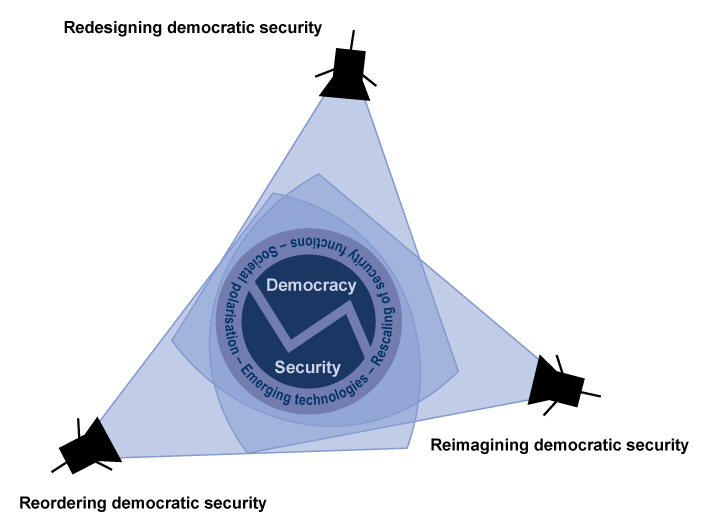The graduate programme combines three research perspectives to develop a comprehensive understanding of emerging security configurations. The graduate programme studies how democratic security is reordered, reimagined and redesigned in turbulent times.

Reordering democratic security
The first research perspective focuses on emerging landscapes of security in turbulent times. Security is increasingly scaled up to regional, global and multilateral security arenas and scaled down to local or informal actors, which affects established understandings of legitimate authority and democratic control of security. At the same time, states attempt to increasingly reinstate control over matters of security by strengthening their borders or military capabilities or by turning to increasingly autocratic forms of rule. The focus on reordering democratic security seeks to understand the simultaneity of these forces away from and towards the state, the peculiar landscapes of in/security they constitute and their effects on the democratic quality of security.
Projects in this stream address these diverging forces in the emergence of new landscapes of security. They inquire into the nature and legitimacy of plural forms of security provision by both public and private actors and assess how norms of accountability, participation, transparency and inclusivity can be brought to bear on new security constellations beyond and below the state. They also ask how the reaffirmation of state power and control affects the democratic features of new landscapes of security, when tackling issues such as pandemic contagion, terrorism, or humanitarian crises.
Reimagining democratic security
This research perspective asks how security is claimed and negotiated as an affective matter around which communities and publics form. Its projects study how “security seeking” on different scales is entangled with belonging and othering, collective identities, democratic participation or exclusion and how these dynamics are expressed in public debates and everyday collective practices. It will thus shed light on the various struggles over the democratic qualities of security, claiming that such longings for security have yet to be understood in their affective and ethical aspects.
Projects in this area work at the interface between security, public spheres, community building and affective mobilisation. Potential themes revolve around questions of identity and right-wing publics, security as a populist promise, but also as a humanitarian cause, as well as the ethics of unequal mourning. PhD projects could examine how ethics emerge out of, and are entangled with, everyday resilience practices e.g. in a situation of conflict or in the security crisis of a global pandemic, and how narratives, imagination and moral panic play into the demand for security in increasingly divided social and political spheres. They may address bodily manifestations of security provisions, ontological (in)security as well as trauma and memory as possible sources of community-building and other formations of affective communities.
Redesigning democratic security
The third research perspective focuses on practices of redesigning democratic security in turbulent times. At stake is the creative potential of democratic values and principles in responding to challenging situations, especially those concerned with security. Innovative practices such as democratic experiments and new institutional designs affect contemporary practices of security. Research from this perspective deals with the possibilities, limits and ambiguities of democratising practices on different levels and in formal and informal settings: from the UN Security Council’s (non-)reform to local protests against security measures or civil disobedience, including participatory projects that address the perception of security threats and how to cope with them. We are interested in emancipatory and empowering practices, their norm building power and the ambiguities that come with them.
Projects in this stream focus on community-based approaches to citizens’’democratic involvement, such as gamification or mini-publics and practices of self-protection, strategies of empowerment and inclusion of transnational stakeholders, and the democratisation of local and global security institutions based on a new plurality of stakeholders. They may examine states of emergency and civic resistance in contested settings, practices of contestation, e.g. protest and civil disobedience, and changing security norms. Of interest are also the diffusion of responsibility in ‘resilient’ societies, emerging forms of vigilantism and subversive practices of security provision, as well as claims of rights to protection or self-organisation for new collectivities.

